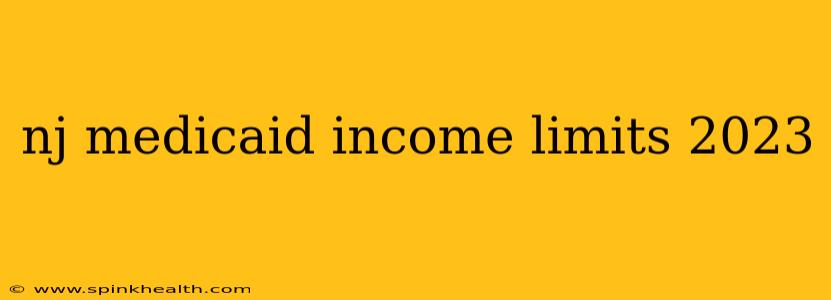The journey to understanding New Jersey Medicaid income limits for 2023 can feel like navigating a maze. It's a complex system with varying eligibility criteria based on factors like age, family size, and disability status. But fear not! This guide will unravel the intricacies, providing a clear picture of who qualifies and how to determine your eligibility. Think of it as your personalized map through the Medicaid landscape.
Our story begins with Maria, a single mother of two in New Jersey, struggling to make ends meet. Her job pays just enough to cover rent and groceries, leaving little room for unexpected medical expenses. She's heard about Medicaid, but the application process seems daunting. This is where our guide steps in – to help Maria and others like her understand the eligibility requirements and navigate the application.
What are the NJ Medicaid Income Limits for 2023?
There isn't one single number that defines the NJ Medicaid income limit for 2023. The limits vary significantly based on several factors. These factors intertwine, creating a personalized eligibility equation for each applicant.
Let's break down some key variables:
- Household Size: The more people in your household, the higher the income limit. A family of four will have a much higher allowable income than a single individual.
- Age: Eligibility rules and income limits can differ depending on whether you're an adult, a child, or a senior citizen. Seniors often have more relaxed income requirements.
- Disability Status: Individuals with disabilities often qualify for Medicaid even if their income is slightly above the general income limits.
- Pregnancy: Medicaid provides crucial coverage for pregnant women, often with more lenient income guidelines.
Finding Your Specific Limit:
The most reliable way to determine your precise income limit is to use the official New Jersey Medicaid website or contact the New Jersey Department of Human Services directly. They have interactive tools and resources designed to help individuals assess their eligibility quickly and efficiently. Don't rely on outdated information or estimations found elsewhere online. Official sources are critical for accurate guidance.
How are Income Limits Calculated?
NJ Medicaid uses your modified adjusted gross income (MAGI) to determine eligibility. This isn't simply your total income. MAGI considers several factors, including:
- Gross Income: Your total earnings before taxes and other deductions.
- Deductions: Specific deductions, such as those for self-employment expenses or certain medical expenses.
- Tax Credits: The amount you receive in tax credits can also influence the calculation.
This calculation is complex, so it’s essential to consult the official guidelines or seek professional assistance if needed.
What if my income is slightly above the limit?
Don't give up hope! Even if your income is just above the limit, there might still be options available. There are programs that offer assistance to those close to the threshold, and exceptional circumstances may also be taken into account. It's always best to apply and fully explain your situation.
What Documents do I need to apply?
Applying for Medicaid requires providing documentation that verifies your income, household size, and other relevant information. This typically includes:
- Proof of Income: Pay stubs, tax returns, and bank statements.
- Proof of Identity: Driver's license, birth certificate, or passport.
- Proof of Residency: Utility bills, lease agreements, or other documents establishing your New Jersey residence.
What are the different types of NJ Medicaid?
New Jersey offers various Medicaid programs tailored to specific populations. Understanding these differences is crucial for successful application. These include, but aren’t limited to:
- Medicaid for Adults: Covering adults who meet income and resource requirements.
- Medicaid for Children: Providing healthcare coverage for children from low-income families.
- Medicaid for Seniors and People with Disabilities: Catering to specific needs of this population group, often with more relaxed eligibility standards.
Is there a waiting period for NJ Medicaid?
There is generally no waiting period for Medicaid coverage once you're approved. However, processing times can vary, so it's crucial to apply as early as possible to minimize any delay in receiving benefits.
How long does it take to get approved for NJ Medicaid?
Processing times can vary depending on the volume of applications and the complexity of individual cases. It's always a good idea to follow up with the New Jersey Department of Human Services to check on the status of your application.
Maria, after understanding the process and meticulously gathering the necessary documents, successfully applied for NJ Medicaid. She now has access to the healthcare she needs, providing peace of mind and allowing her to focus on her family. Her story highlights the importance of understanding the complexities of the system, and how, with the right knowledge, the seemingly daunting process can become achievable. Remember, seeking help from official sources and advocates can significantly ease your journey.

